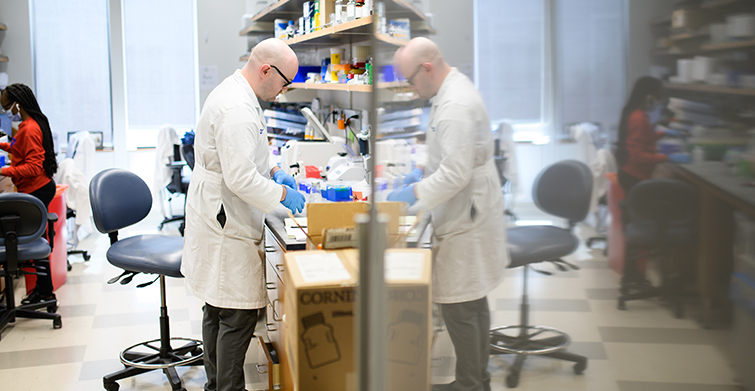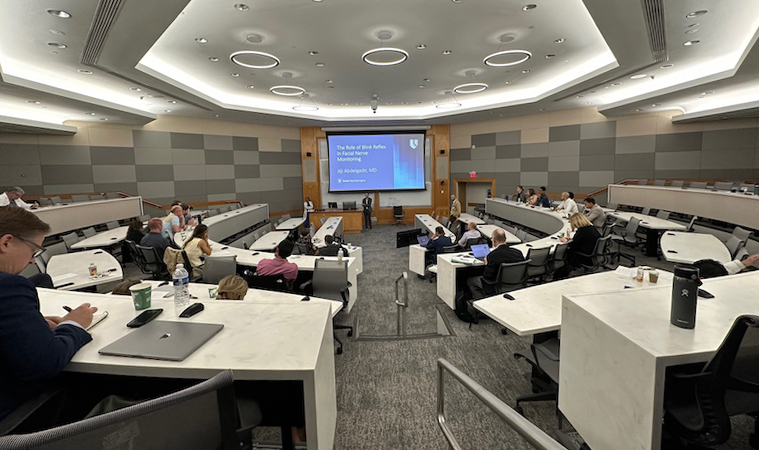Residency Coaching Program
Duke Neurosurgery Residency has a novel coaching program, with specific objectives for trainees at every stage of their residency career.
PGY1
COLLABORATIVE COACHING PROGRAM WITH PSYCHOLOGY INTERNS
This program aims to improve physician well-being and combat burnout by fostering meaningful relationships between psychology interns and neurosurgery residents. It's built on a friendship between a resident and a psychology graduate student, benefiting both as a trained listener and stress management support.
PGY1-4
WELLNESS SESSIONS WITH FACUTLY FACILITATOR
Wellness sessions are built into the regular weekly conference time over the course of the academic year. Faculty explore specific themes with junior residents to help them debrief challenging situations that may come up during their time as junior residents.
PGY5
CLARIFYING AND ARTICULATING VALUES
As trainees move into senior residency, they receive individual and group coaching sessions with an executive coach to step more fully into leadership roles. The focus is on clarifying and articulating their personal values.
PGY6
INDIVIDUAL AND GROUP COACHING FOCUSED ON LEADING TEAMS
During the chief year, more comprehensive executive coaching supports residents in their new leadership roles. Under the guidance of a coach, they have the opportunity to further hone their skills as leaders of patient care teams.
PGY7
TRANSITION TO PRACTICE
In their final year of training, our seventh year residents have the opportunity to meet twice with an executive coach as they look ahead to graduation. These sessions can be tailored to meet the specific needs of the resident as they navigate the transition from resident to attending.
Program Improvement
Duke Neurosurgery residents collaborate with leadership and faculty to guide continuous improvement in the training program. A resident-chosen group of trusted faculty – nicknamed the Gang of Five – meet with the residents every other month, alternating with meetings with leadership. These meetings allow for feedback and program changes, producing many new opportunities over the years that have improved the well-being and education of the residents.
Physician Scientist Track

Residents have the opportunity to select a formal research training track in the junior resident years. This can be coupled with basic science grant funding through our NIH R25 training grant. Residents within this track work with mentors and a selected advisory committee to guide design and conduct of a focused research project within their field of interest.
Educational Conferences
Our weekly education conferences consist of a department wide conference from 7:00am to 8:00am and a resident education conference from 8:15am-9:30am.
The department conferences consist of resident led case conferences, monthly Morbidity and Mortality conference, guest speakers, mock oral boards, and guest speakers from Duke University and other institutions.
The resident education conferences cover a wide range of neurosurgical topics rotating over a three-year curriculum. These conferences are led by senior residents and faculty focusing on basic knowledge and surgical decision making.
Clinical Case Conference
This conference occurs every other Tuesday evening and chief residents present interesting recent cases from their service. Faculty then provide education and clinical pearls around surgical decision making and techniques.

Innovation
Duke's Neuro-Innovations Program offers a one-of-a-kind opportunities for residents to formally foster and advance the types of additional interests that will make them highly desirable in the field.
Surgical Autonomy Program
Duke Neurosurgery’s residency program is designed to maximize academic and surgical potential in a collaborative environment that optimizes individual patient care and more global contributions to the field of neurosurgery. For example, our novel Surgical Autonomy Program (SAP) permits all residents to advance through specific steps for every type of operation, culminating in their ability to perform all procedures with minimal supervision.
In this article in the journal Neurosurgery, Duke Neurosurgery faculty and residents describe the SAP at work. In a pilot study, they combined social learning theory with a competency-based scale to study an anterior cervical discectomy and fusion, with three individual residents taught by a single faculty member.
Here's residency program director Michael Haglund, MD, PhD, describing the SAP: